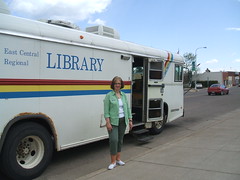While playing organ for a worship service this morning, I carried the analogy begun in my
previous post even further.
Whenever I play organ in a church, I hear my German Lutheran Grandpa Walter's voice -- indeed his spirit often is near me. He used to complain mightily about the organist in his church (who, incidentally, was my beginning piano teacher.) He said she played too loudly, "only for herself," he claimed.
As I've thought about his critical comments, I now know that the duty of the organist is as accompanist to guide the worshippers through their experience, and lead them in song. They are not there to put on a concert, there are other venues for that. The organist introduces the song, sets the tempo, outlines the melody,
undergirds the dynamics, and then gets out of the way to let the people sing. One of my favorite things to do (in a congregation of good singers when the hymn is well-known) is to drop down to a whisper or maybe even drop out altogether for a verse or a section of
a capella singing. The organ, with its myriad of hidden orchestra components, frames the entire program. With a prelude, the organ centers the attention; in soft, hushed tones it underlies the prayers; through modulation of keys, provides bridges between progressive elements of the
liturgy, with trumpets, it soars with joy; all the while providing the infrastructure upon which community worship and singing happens.
Aha -- organizational leadership! Good leaders set the tone, provide the accompaniment, and get out of the way so that others can accomplish their purpose. And, if the leader is a good one, does it all not for their own glory.
So to wrap this analogy to a beneficial conclusion, and not go on ad
nauseum ;^)
A good library leader:
1. Builds a staff with diverse skills
2. Brings the staff together in teams
3. Blends some teams together as appropriate for tasks
4. Selects compositions/programs for appropriate times/places/audiences
5. Guides teams through the composition of projects
6. Determines planning and pace of programs
7. Enables others to be all they can be (darn, there's that military influence in my background coming out again)
8. Does not detract from purpose through self-
aggrandizationI know a number of library leaders who share my passion for music, specifically organ -- Lars, Judy, Fran, Jane, Linda, are a few that come quickly to mind. Bet they already know this.
Labels: leadership, management, music






